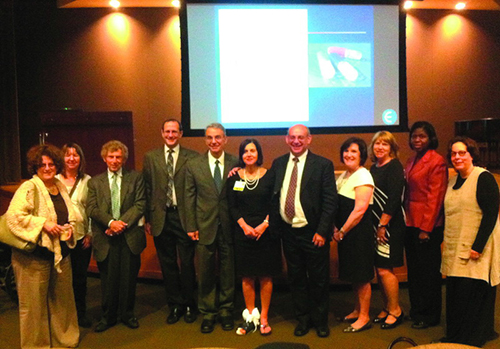
Same medical problems, similar treatment, different systems—that’s what a delegation of medical professionals from Nahariya, Israel learned on their recent visit as part of the Jewish Federation of North Jersey’s Partnership2Gether program. They met with physicians from Englewood, Hackensack, Holy Name, and Mt. Sinai Hospitals to learn how their colleagues in America diagnose and treat breast and prostate cancer.
Dr. Hadassah Goldberg, Director, Oncology Institute at Galilee Medical Center, said she is largely familiar with advances in medical treatment and research by traveling to international conferences and participating in them online, although she notes that the U.S. has more elaborate medical equipment. But the biggest difference in medicine between Israel and the U.S. is in the way it’s managed.
“Everybody has health insurance in Israel,” Dr. Goldberg said. “When you make aliyah, the day you get off the plane, you have it.” But some still have more than others. Israelis can add insurance that allows them more choices of physicians. “We see private patients after regular hours,” Dr. Goldberg said.
As part of a presentation for the visitors at Englewood Hospital by breast cancer specialists, Dr. Goldberg briefed her colleagues about research studies at Galilee Medical Center. “One in nine women in Israel gets breast cancer,” Dr. Goldberg said. “We are seeing more patients and aging patients; survival is improving, as is our reputation.” Quoting Rambam, who advised physicians to “treat body and soul,” Dr. Goldberg described a study which showed that cancer patients who participated in dance therapy had less muscle pain and better appetites. She also described a study that looked at biomarkers as predictive of liver metastases. Treating cancer before it metastizes is critical to survival.
Avia Kauffman, Oncology Nurse and Palliative Coordinator at Galilee Medical Center, wrote in an email after the visit that seeing similarities in treatment was helpful. “I got confirmation of what we actually do. This increases one’s confidence in our procedures.” She said she was most impressed by the physicians’ “concern about the wellbeing of the patient, besides his specific medical problem.”
Dr. Deane Penn, Director of the Federation’s Medical Task Force, has been a practicing gastroenterologist and internist for over 35 years and now directs the Center for Medical Weight Loss of Bergen County. He shed some light on how legal issues influence decisions about medical care.
“The task force from Nahariya saw the latest technology and heard about the latest drugs,” Dr. Penn said. “But they aren’t in as much of a rush to use them. In Israel, the legal system isn’t as strong, so they don’t have to rush in to do surgery. If there is a slow growing cancer, maybe a lesser therapy can be effective. In the U.S. if we see something, we operate. If we know a drug results in only a 50% cure, we use it, despite the expense. Israel doesn’t give all those drugs, and controls costs better.”
There are some methods of patient care here that the Israelis are considering. “They don’t have Physician’s Assistants in Israel,” Dr. Penn said. “The Federation has been sending Physician’s Assistant students from Touro College for a month at a time and now Israeli hospitals are considering their own programs.” Here’s a surprising difference in care: In Israel, rabbis don’t speak to patients, nurses in hospice care speak to them. Israel has asked the Federation for a program to include clergy in patient care.
As with all the Federation’s partnership delegations, establishing relationships with American colleagues gets high marks from the Nahariya medical professionals. Asked about the most valuable take away from the visit, Kauffman wrote, “the good personal relationships established between our delegation and the medical staffs in the different medical centers we visited, and the wonderful, warm relationships with members of the staff of the Federation.”
The trip was organized by Galeet Lipke, Coordinator, Partnership2Gether Community and Medical Task Force.
By Bracha Schwartz








